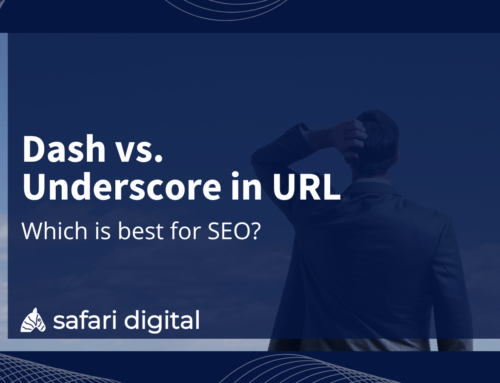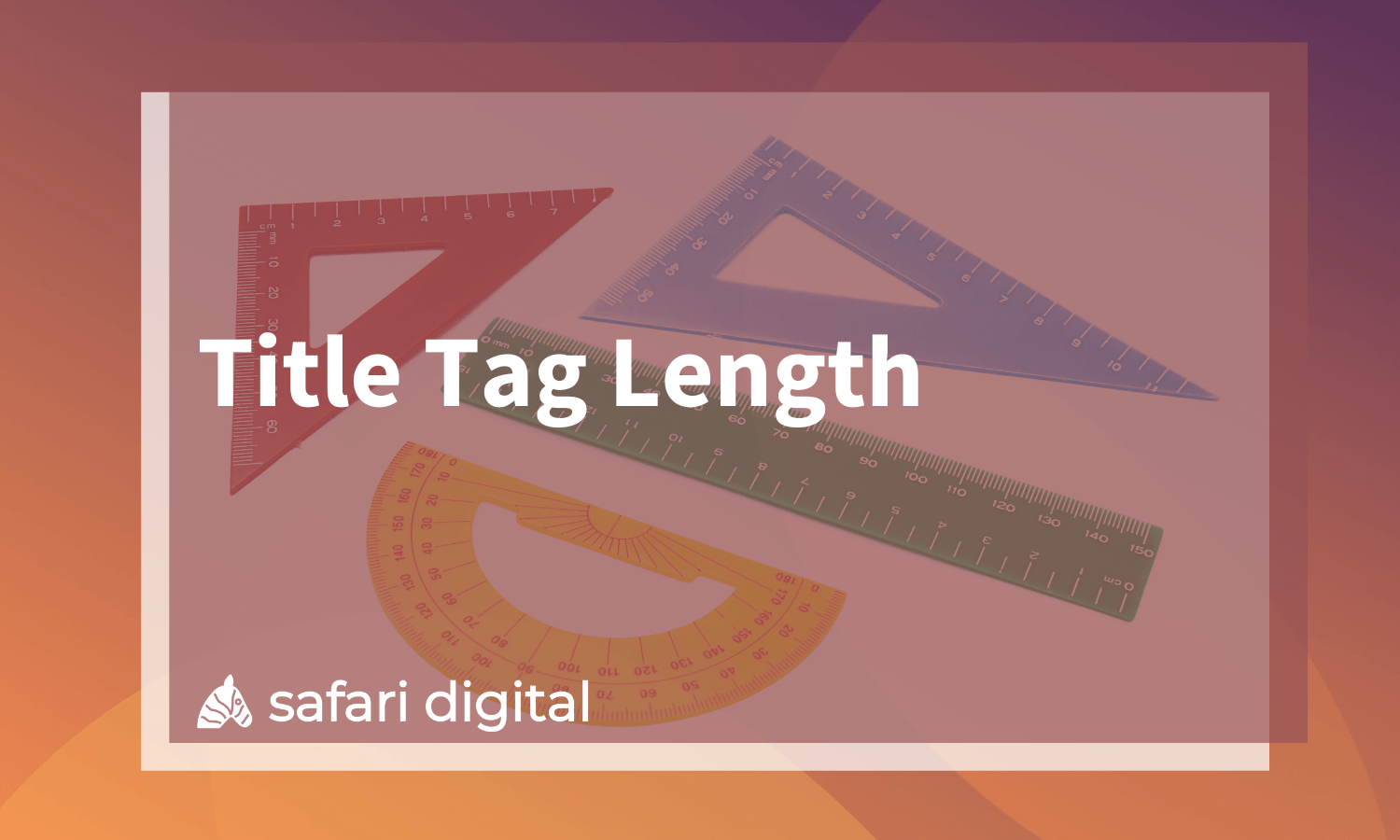
Whether you’re a seasoned SEO pro, or you’re just starting out on your SEO journey, it should come as no surprise that meta titles or SEO page titles are one of the most important SEO ranking factors.
Essentially, the meta title is a brief summation of what users can expect to find on your web pages and your opportunity to tell Google (and other search engines) what your web pages should appear for in the organic search results.
But how long is too long and how do you strike the balance between user experience and keyword usage? In this article, we’ll take a look at the role of title tags, how you can craft the perfect page titles and the ideal length that you should be aiming for?
Table of Contents
1. What are title tags?
2. What is the ideal page title length?
3. Why are page titles important for SEO and UX?
4. How important are page titles as a ranking factor?
5. Why has the ideal page title length changed over time?
6. Tips for writing the perfect title tag
7. Tips to stop Google from shortening your page titles
What are title tags?
Title tags are the piece of HTML code tag that specifies the title of a web page. Title tags, otherwise known as meta title tags, can be found in the browser title bar and the search engine results pages (SERP) on Google. Put simply, they’re what you click on to get to a website when you’re browsing through your search results.
What is the ideal title tag length?
The ideal title tag length is between 50 and 60 characters. This range means that your title tag will be correctly shown on both desktop and mobile browsers, and it won’t be shortened and truncated by search engines. 50–60 characters also allow you room to convey the message and intent of your page, enhance your brand, improve the user’s experience, and ensure the title tag’s readability.
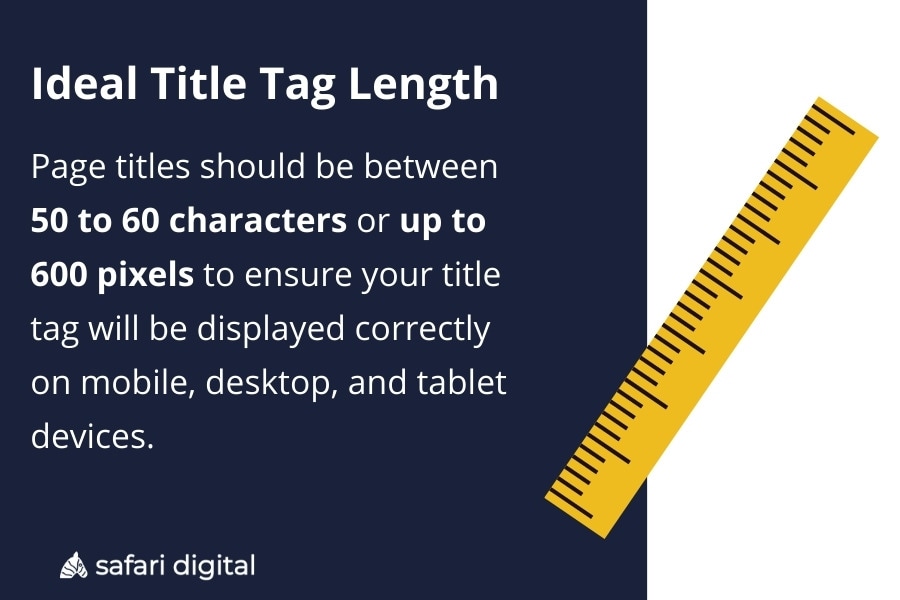
You don’t want your title tag to be too long, as it will be shortened, preventing search engine users from fully reading it and understanding the page’s content. On the other hand, a title tag that’s too short may struggle to convey your message and intent, wasting the opportunity to enhance your site’s branding.
Since Google typically only shortens title tags if they’re too lengthy, it’s best to work within the real estate that is available in SERPs. The first 50-60 characters are what search engine users initially see of your website, so it’s crucial to make a positive first impression!
What does Google say about title tag length?
Here’s where things get confusing, Google’s official stance is that there are no restrictions on title tag length. Just like meta description length, title tags can be as long or as short as you like, they should just provide a relevancy signal to search engines and users that effectively conveys the contents of a web page – irrespective of how long that needs to be.
So then, is this good advice? Well, in our experience, we’d have to disagree with this guidance.
The difference between a good page title that uses the correct keywords and abides by a 50–60-character limit and a page title that is essentially a long summation is night and day. We would recommend SEOs take Google’s guidance with a grain of salt when it comes to page title length.
Quick fact: Google shortens 61% of all title tags.
According to the latest research, Google shortens 61% of all title tags that are specified by websites. So then, why is this happening and what can you do to ensure that Google is using your specified page title in the search engines results pages?
The main reason Google shortens title tags is that they’re too long to show in SERPs. Google typically shortens title tags once they get over 60 characters. 60 characters are (on average) made up of between 8 and 15 words — which is really not a whole lot to get your point across and entice readers over to your website.
Why are title tags important for SEO?
Title tags are the conduit between the SERPs and the website, as well as a key SEO marketing factor in their own right. They’re essential for several key reasons:
• Visibility: A meta title tag is the first element of your webpage that users see in SERPs. When your title tag is effective, it will entice the reader to click through to your website.
• Relevance: Title tags are critical to helping search engines like Google understand the content and intent of your webpage and how relevant it is to the user’s search query.
• Branding: Apart from making your title tag relevant, you can also use the tag to enhance your brand’s visibility — positioning you as an authoritative source in your industry.
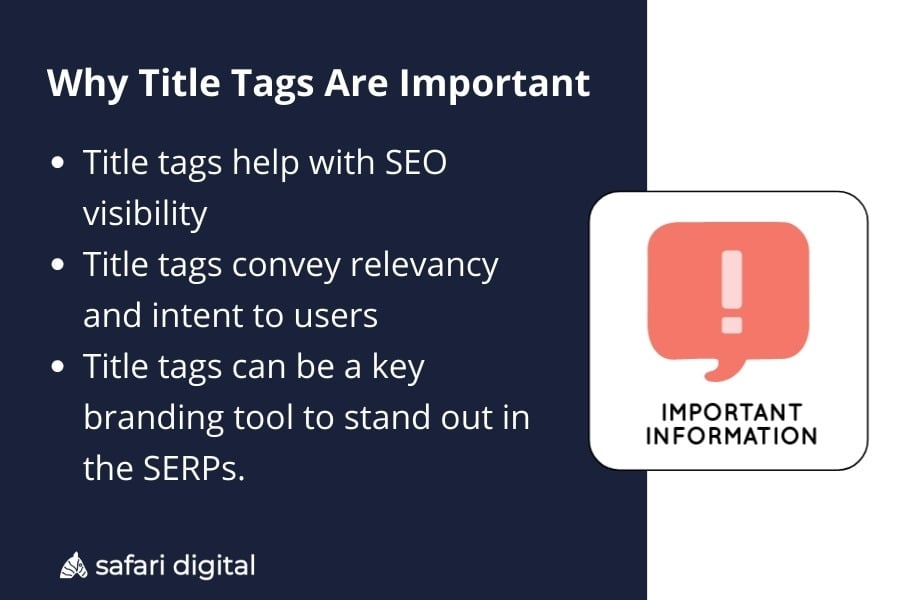
How important are SEO titles as a ranking factor?
There are no two ways about it – page titles, meta titles, SEO titles or whatever else you want to refer to them as are the most important on-page ranking factors.
Yes, we understand that this statement is at odds with many SEOs who reference a 2021 interview with John Mueller in which he stated:
“One of the things I think is worthwhile to keep in mind is we do use titles as a tiny factor in our rankings as well.
So it’s something where I wouldn’t necessarily make titles on your pages that are totally irrelevant.”
At the risk of ruffling some feathers, we are going to politely disagree on this statement.
A well-planned and optimised title tag will boost your search engine rankings and increase your organic traffic. Receiving more clicks to your website will increase conversion rates and ultimately help your overall business growth.
Why has the title length changed over time?
Over the years, Google (and other search engines) have changed the recommended title tag length on a number of occasions. Notably, back in 2016, Google increased the display length from 50–60 characters up to 70, only to revert back to the 50–60-character limit within a few months.
So then, why do search engines change the title length? Well, search engines may change the title length for the following reasons:
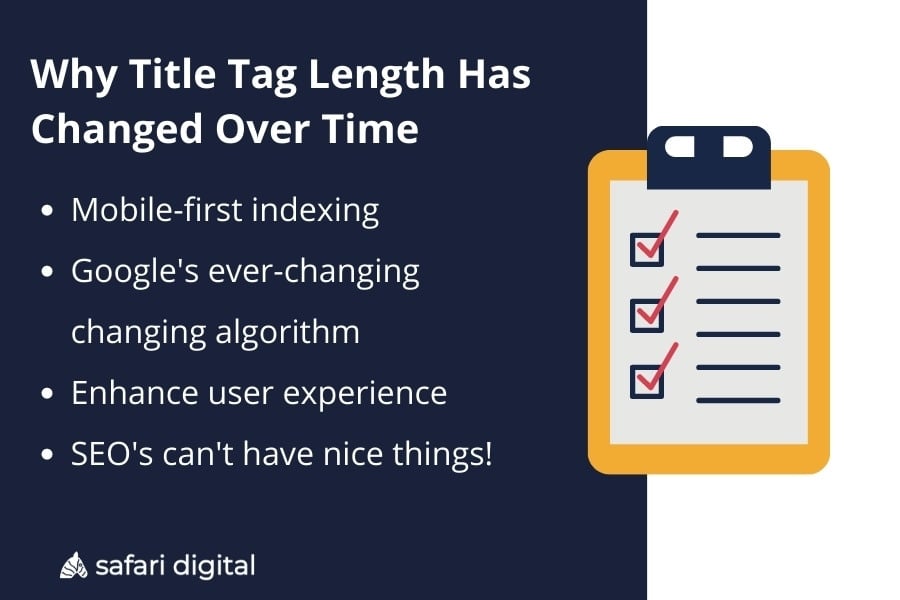
Mobile-first indexing: As many search engine users query through their mobile phone browsers, search engines adapt their algorithms to make the content mobile-friendly. As the screens are vertical and much smaller than desktops, the ideal title tag length for mobiles is shorter.
Changing algorithm: Search engines are constantly updating their algorithms to give users the most relevant and high-quality results. Humans aren’t static beings, so as user behaviour and the patterns of their search queries change over time, so does the ideal title tag length.
User experience: Shorter title tags may be more readable, resulting in higher engagement from SERPs. Search engines take user experience into account, so they may adjust the length of title tags to offer the best search experience for their users.
SEOs can’t have nice things: this is a big one and one that is often overlooked. SEOs (in general) tend to use and abuse in the quest for short term gains. The same goes for title tags. Given 60-70 characters to work with, many SEOs resort to keyword stuffing which compromises the user experience.
Things to remember when writing the perfect title tag
- Keyword research — Identify the most relevant and high-traffic keywords for your target audience.
- Place your target keyword at the start of the title — For maximum impact and visibility, place your primary target keyword at the beginning of the page title.
- Consider search intent — Create a title tag that addresses your target audience’s needs and expectations. Is their search intent informational or transactional? Adjust your page title according to what you’re trying to achieve and what they’re trying to find.
- Make it unique & interesting — Especially if you’re writing on a popular topic, making your title tag unique helps your page stand out from the competition and entices more clicks.
Tips to stop Google from shortening your SEO title tag
Predicting whether Google will shorten the title tag you spent so long crafting can be challenging. Search engines may change a single word of your title tag, remove brackets or pipes, or rewrite the title tag completely. Seeing your page go live and learning that Google has changed your title tag can be disheartening to website owners and SEO specialists —we speak from experience. But that experience means that we can confidently share some tips that can help prevent Google from shortening your title tag and make it more SEO-friendly:
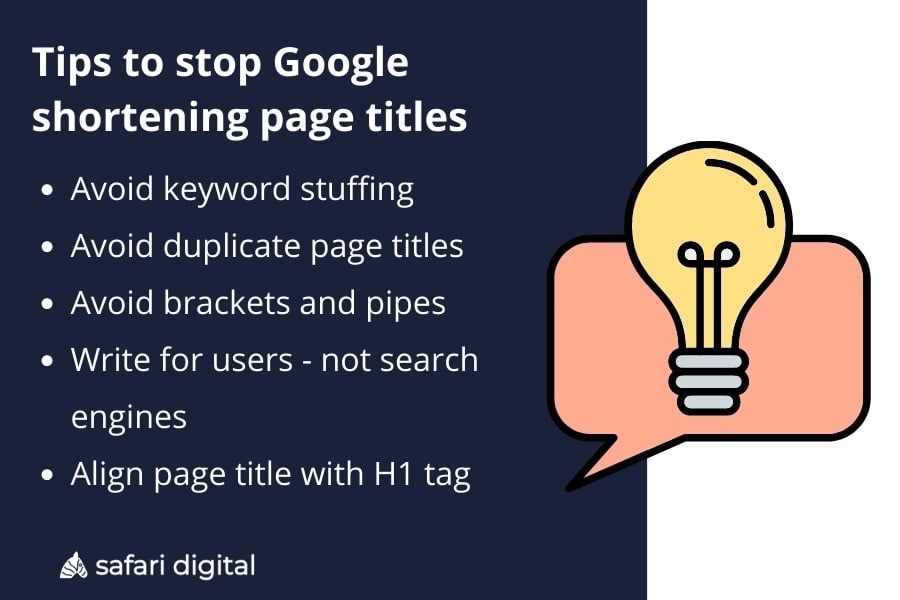
- Refrain from overstuffing with keywords — Trying to shoehorn in too many prominent keywords and unnecessary brand names can make your title tag sound spammy. It will also likely lead to Google truncating your page title. Stick to one or two main keywords that most accurately represent the page, and only add your brand name if necessary.
- Avoid duplicating other page titles on your site — To avoid confusion and cannibalisation, ensure each page has a unique title tag. Two title tags that are too similar might mean that neither page gets the traffic they deserve.
- Avoid brackets and pipes — Although they can help page titles stand out, the recent study showed that Google changed page titles with brackets 77.6% of the time and replaced or eliminated pipes 41% of the time. If you want to use brackets and pipes, try parentheses and dashes instead, as these fared much better in the study.
- Ensure you think of the user when you write the title — Your title tags should be informative, relevant, and easy to understand. You should also avoid clickbait titles and titles that don’t accurately reflect your content.
- Align your page title and H1 tag — Make sure your page title tag and H1 heading share the same message and purpose. While your H1 heading and title tag doesn’t have to be identical, it’s best to keep them similar. Use the same keyword(s) in the title tag and H1 to maintain consistency and avoid confusing discrepancies.
Final thoughts
While making a good title tag can sometimes seem like an afterthought — something to do once your page is ready to publish — there is no doubt that they are the most important on-page ranking factor and should be the priority when creating content for your website.
SEO page titles under 60 characters, so they don’t take long to optimise. Take the time to choose the best title tag with the appropriate keywords at the front to improve access and traffic to your website and the pages you create. On the other hand, it’s essential to avoid overstuffing and over-optimising your meta title tag. Strike a balance to create the perfect meta title tag that will make your website shine.





